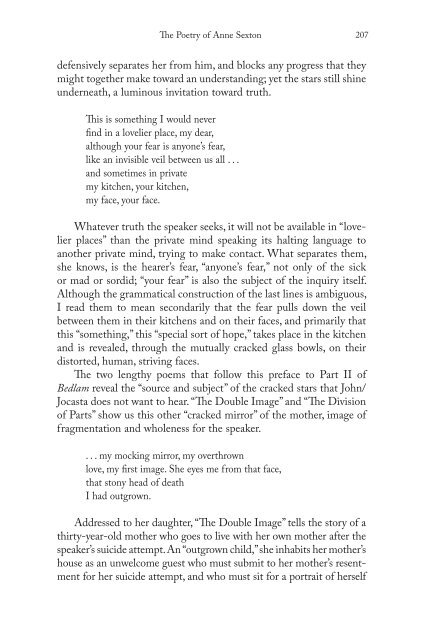Bloom's Literary Themes - ymerleksi - home
Bloom's Literary Themes - ymerleksi - home
Bloom's Literary Themes - ymerleksi - home
Create successful ePaper yourself
Turn your PDF publications into a flip-book with our unique Google optimized e-Paper software.
The Poetry of Anne Sexton 207<br />
defensively separates her from him, and blocks any progress that they<br />
might together make toward an understanding; yet the stars still shine<br />
underneath, a luminous invitation toward truth.<br />
This is something I would never<br />
find in a lovelier place, my dear,<br />
although your fear is anyone’s fear,<br />
like an invisible veil between us all . . .<br />
and sometimes in private<br />
my kitchen, your kitchen,<br />
my face, your face.<br />
Whatever truth the speaker seeks, it will not be available in “lovelier<br />
places” than the private mind speaking its halting language to<br />
another private mind, trying to make contact. What separates them,<br />
she knows, is the hearer’s fear, “anyone’s fear,” not only of the sick<br />
or mad or sordid; “your fear” is also the subject of the inquiry itself.<br />
Although the grammatical construction of the last lines is ambiguous,<br />
I read them to mean secondarily that the fear pulls down the veil<br />
between them in their kitchens and on their faces, and primarily that<br />
this “something,” this “special sort of hope,” takes place in the kitchen<br />
and is revealed, through the mutually cracked glass bowls, on their<br />
distorted, human, striving faces.<br />
The two lengthy poems that follow this preface to Part II of<br />
Bedlam reveal the “source and subject” of the cracked stars that John/<br />
Jocasta does not want to hear. “The Double Image” and “The Division<br />
of Parts” show us this other “cracked mirror” of the mother, image of<br />
fragmentation and wholeness for the speaker.<br />
. . . my mocking mirror, my overthrown<br />
love, my first image. She eyes me from that face,<br />
that stony head of death<br />
I had outgrown.<br />
Addressed to her daughter, “The Double Image” tells the story of a<br />
thirty-year-old mother who goes to live with her own mother after the<br />
speaker’s suicide attempt. An “outgrown child,” she inhabits her mother’s<br />
house as an unwelcome guest who must submit to her mother’s resentment<br />
for her suicide attempt, and who must sit for a portrait of herself
















